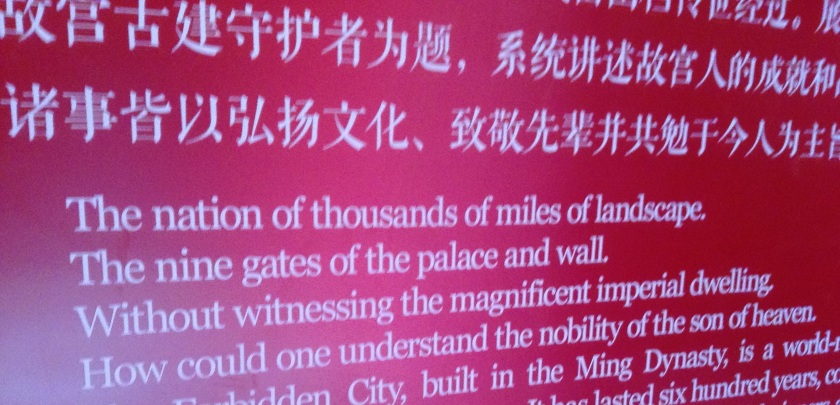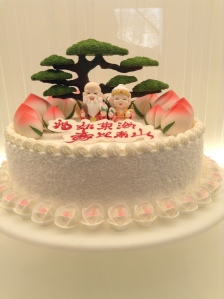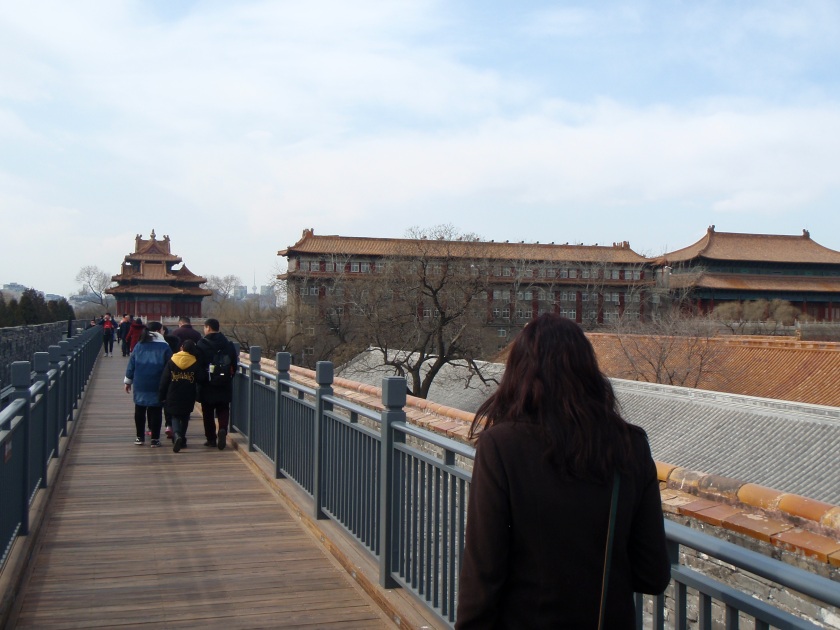Shie shie for your attention, friends,
I have just run through a railway terminal to catch a train (the regular experience of many a hardy traveller), have kicked an older man out of my assigned seat (the regular experience of many younger, worthier sitters), and have opened up our new tablet with a *Gasp* keyboard (having acknowledged that finding an internet café is going to become a more and more irregular experience of most luddite travellers).
We are en route to Xian from Beijing for a few days, primarily to see the terracotta soldiers, a minor tourist attraction you are unlikely to have heard about. Being mostly uninterested in in ancient warriors and the complex tombs of hoary kings, I am sure to be bored with the sight.
Xian promises to be warmer, but Beijing has been quite cold – this being winter and it being so far north. The air quality is good, but most days are overcast – so much so that a day and a half of blue skies and sunshine were a delight to us and, from our hosts reactions, also a welcome rarity. It felt like it ought to be an aphorism.
The last several days of Beijing have had a certain routine. Our hostel serves breakfast, and sometimes I choose their western (cold eggs, potato pancakes, bacon, sausage), but more often their Chinese breakfast (dumplings, steamed buns, hardboiled egg). I tried for the first few days to make due with tea, for the experience, but my addiction has reached such heights that this experiment was quickly abandoned – and easily too, as the Chinese have realized that Western tourists crave coffee at its darkest and blackest and are happy to provide. Sometimes we eschew breakfast at the hostel and visit a local bakery. There is a chain here called Holliland where the pulchritudinous Chinese staff wear pleasing powder blue uniforms with white collars and high hems. The place has a Dutch feeling to it, with all pale blues and subdued yellows. The walls are decorated with bread coiled and washed in the most enticing ways, but the central glass cabinets are filled with Chinese delicacies of pineapple, coconut, red mung sweet buns, or custard tarts, or savoury buns with pork floss decorations. They have black coffee suitable to my requirements, but their tea comes in a milky form a bit too sweet for Barbara.
One wall in each establishment has a display case full of ridiculously ornate cakes for sale. Some have rose petals, others have tiny tophats or pagodas atop them. The largest and most elaborate is a three or four tier Princess’ castle, complete with minarets, gates, and tiny marzipan Royals. It is listed as Y7000, or about $1400.
This is a strange Socialist country. There is plenty of private enterprise alongside the central planning. Wealth signifiers are very prevalent – especially in the capital, Beijing. A car, for instance, is not really a useful encumbrance. Beijing’s subway and bus system (mostly built in the last ten years, especially in the lead-up to the Olympics) is absolutely stellar. The city itself has over 5 ring roads, each 8-12 lanes wide and not super busy. There isn’t a great deal of traffic, because people are moved too efficiently. But to have a car is to be wealthy and important (there is a great deal of tax imposed on driving in Beijing). It seems very desirous to appear wealthy and important. (I do not mean to insult, merely to describe).
The subways make it easy to get around, but Beijing is an utterly massive place. We walk about 20km a day, even with the transit, and crawl into bed at the end of the day with swollen and blistered feet. My hiking boot is not fitting perfectly and at least one little piggy is more blister than toe.
Beijing is a marvelous mixture of old and new. The Hutong I mentioned are enchanting and rich, full of bicycles, scooters, and little enclosed scooters resembling a tiny tin truck. Even a few cars. There are restaurants, and many public toilets (convenient, but a reminder that many houses do not have plumbing, or did not until recently). Red lanterns for festival time hang overhead and rooves are tiled in that iconic Chinese manner.
The big streets are massive and comfortable and full of hundreds of modern shops of all manner. Banks, convenience stores, music stores, and clothing emporia are easy to find. There is a supermarket down the road called Wumart, where we can purchase wine for $5 and some snacks for the day.
We took a walk around the Houhai lakes the other day, and fortified ourselves in a tiny brewpub in one of the hutongs, enticingly named the Great Leap Brewery. The Ramones, Rancid, and other punk tunes floated down from the ceiling, while the chalkboard listed over two dozen beer to choose from – some local microbrews and some imports. We loved it so much, we didn’t want to leave and I bought an emblazoned sweater to remember it by.
Yesterday we finally got into the Forbidden City on our third try. They only (!) sell 80,000 tickets a day and this is festival season, so we have never managed to make it before the cut off. Yesterday was the exception, and we found ourselves in a press of about 3,000 people (no lineups) trying to make it through 5 security stations to get in (metal detectors, bag scanners, the usual). That was the first hour.
The FC is humongous and five more hours exploring this palace complex, the home of Qing and Ming emperors, had our feet even more swollen than usual. It was a fascinating experience, worth elaborating upon, but I think pictures might do it more justice.

So I’ll skip to us hobbling out, our feet black and blue from the unforgiving flagstones, staggering the extra few kilometres to find a pub. There’s something about sitting down and tasting that first sip after an exhausting and punishing day. The exquisite relief is something to be savoured. Much like blue skies in Beijing.







